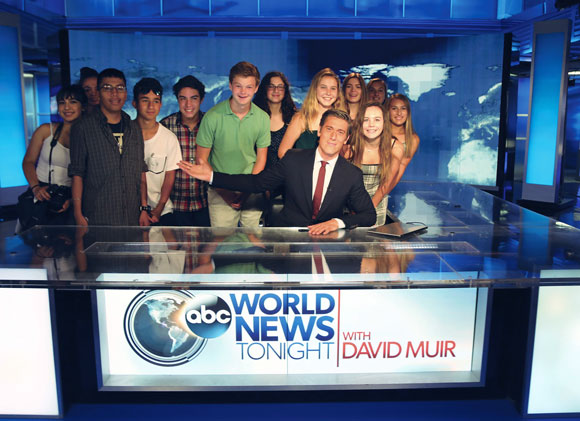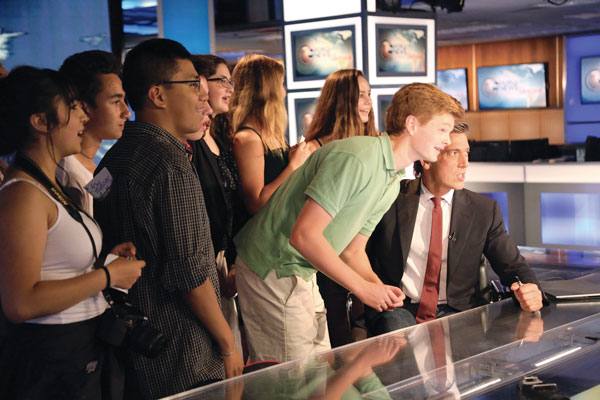FEATURE INTERVIEW - August, 2018
ABC's David Muir
A FastForward Interview With the Anchor of ABC World News Tonight
REPORTERS: Kyle Austin, Kylar Flynn, Gigi Gonzalez, Simone Harper, Brandon Lopez, Jacqui Martin, Claire Mckechnie, Lauren Mckechnie, Samantha Michaels, Joshua Santos, Anna Silverman, Lilli Wanninger
As the anchor of ABC’s World News Tonight, David Muir is one of the most prominent and respected figures in broadcast journalism today.
D uring a visit to ABC News headquarters in Midtown Manhattan, we watched him from a glass hall above the set as he delivered the news to an unseen audience of millions. He may be the show’s on-camera anchor, but when the cameras are off his work continues. During commercial breaks, Muir read, typed notes and reacted to real-time developments with diligence and focus—not at all a guy who just reads a teleprompter. Producers and staffers updated Muir by the second, giving him that edge required in an age of social media and rapid-fire communication. Taking it all in, we couldn’t help but wonder what it takes to work in such a stressful yet thrilling profession. As the program ended we went down to the super-cool glass-and-skyscrapers ABC News set to chat with Muir and find out.
uring a visit to ABC News headquarters in Midtown Manhattan, we watched him from a glass hall above the set as he delivered the news to an unseen audience of millions. He may be the show’s on-camera anchor, but when the cameras are off his work continues. During commercial breaks, Muir read, typed notes and reacted to real-time developments with diligence and focus—not at all a guy who just reads a teleprompter. Producers and staffers updated Muir by the second, giving him that edge required in an age of social media and rapid-fire communication. Taking it all in, we couldn’t help but wonder what it takes to work in such a stressful yet thrilling profession. As the program ended we went down to the super-cool glass-and-skyscrapers ABC News set to chat with Muir and find out.
FastForward: What does an average day in your life look like?
David Muir: Every day is different. It’s impossible to predict what the next day will bring, but that’s the great gift of this job: to witness history in real time. It was my dream as a kid that I would see the world, and that is exactly what I have been doing for the last few years here: traveling the world, and then sharing my stories with people at home. It’s like what I did as a kid: my mom would come from work and she would literally say to me “Give me five minutes!” at the front door, because I always raced down to bombard her with my stories. Now, I do it in front of millions.
FF: Do you remember the first time you were on air? How did you feel?
DM: My first night was on Labor Day, four years ago. Diane Sawyer was the anchor before me, and I was very nervous. I remember after the opening played, and I said, “Good evening,” my heart was beating louder than the words coming out of my mouth. I wasn’t even sure what I was saying, but I just kept going. I think that adrenaline, and the nerves involved, are actually a good sign: it shows that you are human, that you are feeling what people at home are feeling. My heartbeat has subsided a bit since then, which is good thing.
 FF: How do you type and come up with ideas so fast?
FF: How do you type and come up with ideas so fast?
DM: One of the most important skills of broadcast journalism is the ability to be nimble and think on your feet, particularly in this environment of breaking news as you’ve all witnessed. You’re a lot younger than I am, but we just witnessed the most contentious election of our lifetime: now, as we cover this administration, we often throw out the lead story literally an hour or even half hour before air. Because of that, we have to be ready for whatever comes our way, because the viewers at home have an expectation that you’ll handle it. You help cut through the noise that they’ve bombarded with all day long.
FF: How do you deal with situations in which you must improvise?
DM: There is a lot of breaking news in this industry. There is a lot of ad-libbing and a lot of reporting on the fly if you will. I think the most important thing in those moments is to be extremely careful, extremely steady, because most of the time when we’re on the air with breaking news it’s not necessarily good news, and so our job is to be steady, to be calm, and not to add to whatever the story already is. The slower and steadier you are, the less chances you have of making mistakes on air. And I don’t mean flubbing a word here and there. That’s human. I mean going slowly and carefully so that you don’t make factual errors in a moment when it really, really matters.
FF: In your political position, how do you remain neutral when reporting?
DM: It’s central to remember that, when we sit here and when we report out in the field, we are reporting stories in a very divided and polarized country. Partisan politics are nothing new; you always have close elections in this country. But in this environment in particular, you have to remember that half the country is saying give this guy a chance, half the country is saying how on Earth did this happen, and you have to find a way to signal to both sides that you hear them. That you’re asking questions for them. What we try to do is present the news in a way that’s not judgmental and that allows people at home to decide how they feel about what’s transpired on any given day, and I hope we succeed in doing so.
FF: How does it feel seeing yourself on TV?
DM: I’m used to it, so it doesn’t really register anymore. Every once in a while I’m reminded. I was walking down the street and an NYPD car went by and the two officers inside yelled out the window, “Hey David!” and they were waving. That’s so cool! The NYPD! I appreciate that. I’m always encouraged by that. We’re here to connect with people—more than anything, that’s what my job is.